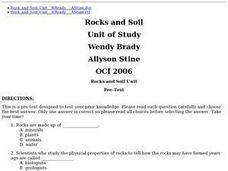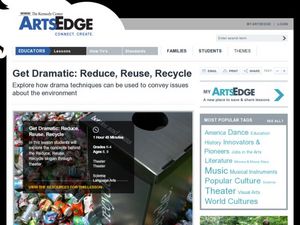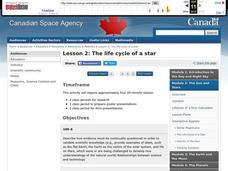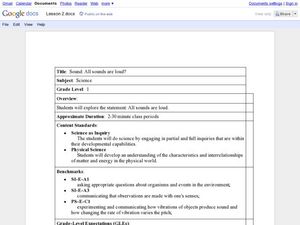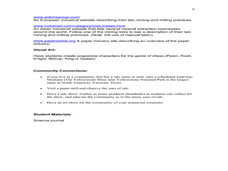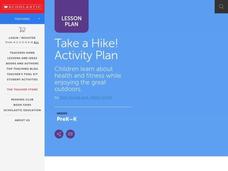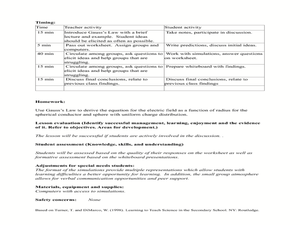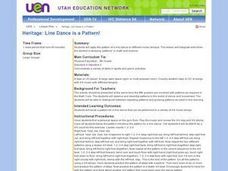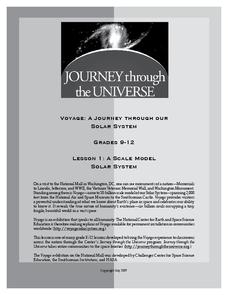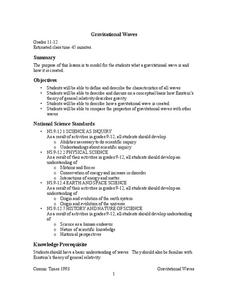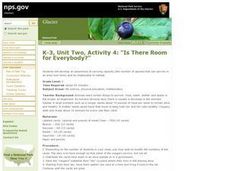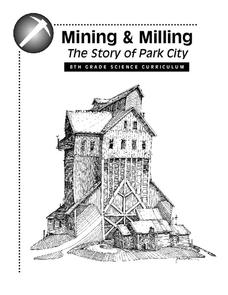Curated OER
Wetland Food Webs
Students study life science. In this food webs and food chains comparison lesson, students examine the wetlands to discover the relationships that exist between the animals that live there. They participate in group activities and...
Curated OER
Rocks and Soil
Students explore the physical properties of rocks. They explore the three different types of rocks and are able to compare and contrast their different properties. Students simulate the creation of sedimentary rock, they also...
Curated OER
What is an Earthworm Like?
Second graders study earthworms. In this science instructional activity, 2nd graders observe an earthworm using a magnifying lens, draw pictures of the earthworm, and record their observations.
Curated OER
Get Dramatic: Reduce, Reuse, Recycle
Students explain reducing, recycling and reusing. In this science/ arts instructional activity, students create a commercial and display a backdrop made out of recycled goods. Additionally, students write written responses to writing...
Curated OER
Mountain Creation: A Drama Exploration
Students explore mountain formation. In this cross curriculum earth science and legend writing activity, students listen to the poem "The Way to make Perfect Mountains" by Byrd Baylor and identify examples of vivid language used....
Curated OER
The Life Cycle of a Star
Students investigate the life cycle of a star and make conclusions based on evidence, research, and observation. In this lesson on space and scientific investigation, students describe the relationships between science and technology...
Curated OER
Systems of the Body: Movement and Choreography
Young scholars create movements that connect art and science. In this body systems lesson, students interpret the function of body systems, organs, and processes as they create movements to exhibit their research findings.
Curated OER
Sound: Are All Sounds Loud?
First graders explore physics by utilizing education software. In this sound properties instructional activity, 1st graders discuss the different sounds associated with different materials and perform an object dropping experiment in...
Curated OER
Bubble, Bubble, Soil and Fun!
Fifth graders experiment to find the physical properties and commercial uses of the mineral talc. They create a soapstone sculpture and a rubric for the creation.
Curated OER
Take a Hike!
Students explore the benefits of staying active by going on a hike. In this physical education lesson, students discuss the concept of a hike, where a good place to hike is and what types of foods are necessary to stay nourished....
Curated OER
Tin Can Stilt Walkers
Students make tin can stilt walkers. In this stilt walkers lesson, students use 48 ounce size cans to make stilt walkers. They practice walking on them to improve their balance in this environmentally friendly art and physical education...
Curated OER
Turtle Hurdles
Students explore physical education by researching biology. In this survival techniques lesson, students discuss the methods turtles use to survive dangerous encounters and conduct a sea turtle role play exercise. Students identify the...
Curated OER
Gauss' Law
Learners derive the equation of Gauss's law. In this physics instructional activity, students investigate the factors affecting the strength of the electric field. They perform simulation on Gauss's law.
Curated OER
Fitness plan: number 3
Students monitor their fitness levels for six weeks of their P.E. course through the use of an Excel spreadsheet. They also research the obesity epidemic among youth in the U.S. today, presenting their findings to the class. This lesson...
Curated OER
Heritage: Line Dance is a Pattern!
Line dancing is the repeating of a pattern of steps, done to music. Teach youngsters how to line dance and they won't feel so awkward when they grow up. Let them experiment with creating their own patterns and teaching their classmates....
Journey Through the Universe
A Scale Model Solar System
Between the time scientists discovered Pluto and reclassified it as a dwarf planet, it did not even make one full revolution around the sun. In two activities, scholars investigate scale models and their properties. Pupils find that it...
Lerner Publishing
Living or Nonliving
It's alive! Or is it? Through a series of shared readings, whole class activities, and independent exercises children explore the difference between living and non-living things, creating a pair of printable books to demonstrate their...
NOAA
The Oceanographic Yo-yo
How does chemistry help deep-sea explorers? Part four of a five-part series of lessons from aboard the Okeanos Explorer introduces middle school scientists to technologies used in ocean exploration. Groups work together to analyze data...
It's About Time
Life (and Death) Before Seat Belts
Did you know only 80-90% of passengers wear a seat belt in a moving car? Young scholars use clay and a cart to complete an experiment about what happens without a seat belt in a collision. The lesson includes Newton's Second Law of...
NASA
Gravitational Waves
Young scientists participate in a hands-on experiment to explore Einstein's theory of relativity in a creative manner. They investigate various waves and compare their characteristics as they discuss how each wave is created. Next,...
Curated OER
Is There Room for Everybody?
Third graders examine the capacity of animals able to live in one habitat. In this habitat lesson, 3rd graders play a game that shows the food chain and the interactions between animals in an area. Students discover that food is a major...
Park City Historical Society & Museum
Mining and Milling: The Story of Park City
Study the chemistry of mining! Through nine lessons in the unit, learners explore different concepts related to mining. Their study ranges from rock and mineral analysis to the environmental impact of dynamite and the chemical reaction...
Cornell University
Exploring Rocks and Minerals
Investigate the properties of rocks and minerals through a rockin' hands-on activity. Learners test rocks for various properties and, using a guide, attempt to identify different samples. They use various properties including hardness,...
Teach Engineering
Physics Tug of War
Slide books with a little assistance from Newton. Using books, groups create a demonstration of Newton's Second Law of motion. Pupils compare the distance traveled by one and two books when they apply a force to them.



